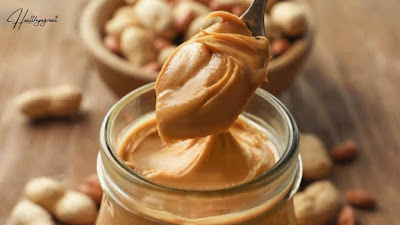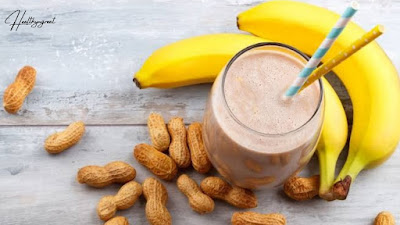What Makes Peanut Butter Better Then Other Butter Types
Peanut butter is one of the world’s most popular spreads. There is nothing that a jar of peanut butter cannot fix. It is crunchy, it tastes amazing and it is enough to satisfy a sweet craving.
Peanut butter is high in healthy monounsaturated fats, nutrient-rich, and it's also rich in fibre and protein which keep you feeling full for longer, so you end up eating less overall, that means it helps weight loss.
Peanut butter also provides a good amount of protein, along with essential vitamins and minerals, such as magnesium, potassium, and zinc. Additionally they also contain 20 amino acids, the most abundant of them being arginine which stimulates the immune system.
They are also known to promote heart health, aid weight loss, prevent gallstones, and help in blood sugar control. Moreover, experts believe that peanut butter in loaded with vitamin E which lowers the risk of cancer.
However not everyone can enjoy peanuts. Some people are allergic, and for a small percentage of the population, they can literally kill. [1]
In this article, we look at the benefits of eating peanut butter, its nutritional value, downside and recipe.
What Is Peanut Butter?
Peanut butter are nothing but roasted peanuts, that are ground until they turn into a paste. However not all commercial brand recipes are simple as that.
Some products contain various added ingredients, such as sugar, vegetable oils and even trans fat. Some may include additives as well.
Studies have also shown that eating too much added sugar and trans fat can lead to various health problems, such as heart disease. [2] [3]
Nutrition Facts
Here's the nutritional value for 2 tablespoons (32g) of smooth (as opposed to chunky) peanut butter with added salt.
- Calories: 190
- 16 gram of Fat
- 140mg of Sodium
- 8 gram of Carbohydrates
- 2 gram of Fiber
- 3 gram of Sugar
- 7 gram of Protein
Low in Carbs
Peanuts butter is relatively low in carbohydrate. In fact a 100g portion of peanut butter contains 20 grams of carbs (13% of calories), 6 of which are fiber. [4]
As peanut butter is low in carb it's is a perfect option for people with type 2 diabetes as it only causes a very low rise in blood sugar, when compared to other spreads. [5]
If fact in one observational study it was found that women who ate peanut butter 5 times per week or more had reduced risk of type 2 diabetes by 21%. [6]
High in Healthy Fats
A 100g portion of peanut butter contains 50 grams of fat, totaling about 72% of calories. Although 50 grams of fat per serving may seem like a lot, most are "healthy" monounsaturated fat and polyunsaturated fat. [4]
Half of the fat in peanut butter is made up of oleic acid, a healthy type of monounsaturated fat also found in high amounts in olive oil. Which is also linked to several health benefits, such as improved insulin sensitivity. [7]
Peanut butter is also rich in linoleic acid, an essential omega-6 fatty acid abundant in most vegetable oils.
It’s a Good Protein
Approximately 35% of peanut butter's total weight is from protein, making it one of the better sources of non-meat protein. A 100g portion of peanut butter contains 25 grams of protein (15% of calories), which is quite a lot compared to most other plant foods. [4]
Although peanut butter is fairly protein rich, it is low in the essential amino acid methionine. People who rely on peanut butter or beans as their main protein source, methionine insufficiency is a real risk.
Low methionine intake has also been hypothesized to have some health benefits. Some studies have shown that low methionine may extend the lifespan of rats and mice, but it’s unclear if it works the same way in humans. [8] [9]
Micronutrients
Peanut butter are packed with all these amazing vitamins and minerals that can help you meet your reference daily intake (RDI) of vitamins and minerals.
Here is how 100 grams of peanut butter contribute to the RDI of key nutrients: [4]
- Vitamin E: 45% of the RDA
- Vitamin B3 (Niacin): 67% of the RDA
- Vitamin B6: 27% of the RDA
- Folate: 18% of the RDA
- Magnesium: 39% of the RDA
- Copper: 24% of the RDA
- Manganese: 73% of the RDA
Additionally they are also high in biotin and contains decent amounts of vitamin B5, iron, potassium, zinc and selenium.
It’s Rich in Antioxidants
Like many other real food peanut butter are also rich in antioxidants. Specially p-coumaric acid which is linked to reduce arthritis in rats. [10]
Peanut butter is also rich in resveratrol, which is associated with a lower risk of heart disease and other chronic diseases in animals. [11] [12]
Additionally peanut butter is also rich in plenty of other biologically active nutrients, which can have some health benefits.
Benefits of Peanut Butter.
Here are 12 amazing benefits of peanut butter.
1. May Promote Heart Health
2. May Aid Weight Loss
3. May Prevent Gallstones
4. May Aid Blood Sugar Control
5. May Reduce Cancer Risk
6. May Treat Erectile Dysfunction
7. May Boost Energy
8. May Relieve Symptoms Of Polycystic Ovarian Syndrome (PCOS)
9. Have Antioxidative Properties
10. May Help Protect Against Alzheimer’s Disease
11. May Promote Skin Health
12. May Improve Hair Health
Peanut allergies
Peanut allergies are one of the most common and potentially dangerous food allergies, affecting no less than 1% of the U.S population and 2% of children.
The symptoms can range in severity from mild to life-threatening. It some cases it may lead to anaphylaxis (all body reaction) characterized by a severe rash or hives, shortness of breath, wheezing, rapid heart rate, and the swelling of the face, tongue, or throat.
If left untreated, anaphylaxis can lead to shock, coma, heart or respiratory failure, and death. According to the National Institutes of Health (NIH). Those with a known peanut allergy should avoid peanut butter and foods containing the nuts. [13]
How To Add Peanut Butter In Diet:
You can simply enjoy them in all time favourite PBJ (peanut butter and jelly) sandwich, add them on cake, add them in protein shake, put them on crackers and enjoy them in smoothie.
There are hundreds of different ways to enjoy them. Here's a simple recipe you can try right now.
Peanut Butter Banana Smoothie
Nutrition Facts : (Serving size 1/2) Calories: 295 Sugar: 21g Fat: 10g Carbohydrates: 40g Fiber: 6g Protein: 12g.
Ingredients
- 2 cups frozen sliced bananas
- 1/2 cup nonfat Greek yogurt
- 1/2 tablespoon ground flax seeds
- 1 cup unsweetened almond milk
- 1 teaspoon vanilla extract
- 2 tablespoons all-natural peanut butter
Procedure:
Toss all the fresh ingredients in a blender and pulse them until you have a desirable texture, pour in your favourite bowl, top them with your favourite garnish, and you are ready to enjoy!
Cheers! 🥂
The Bottom Line
Peanut butter is fairly rich in nutrients and a decent protein source. It’s also loaded with fiber, vitamins and minerals, making them exceptionally good for your health.
However, eating too much peanut butter can increase a person’s daily intake of saturated fat, sodium, and calories. The only way to enjoy them is-in moderation.
If you are new to our blog and prefer our statistics please subscribe us and follow us and you will be notified everytime when we post something new.
Stay healthful
Live satisfied










Post a Comment
0 Comments
If you have any doubt please let me know.